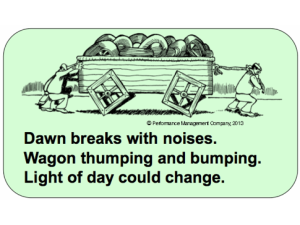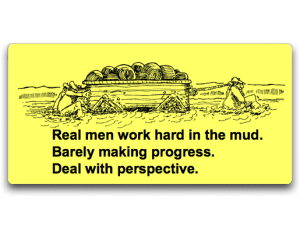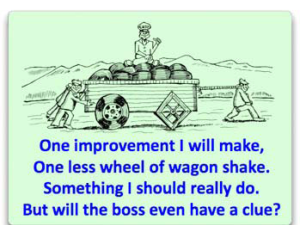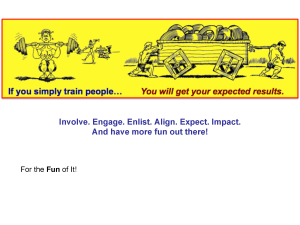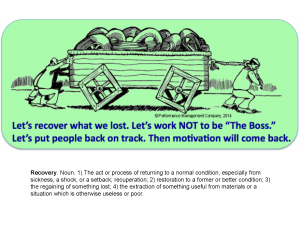 Guest post by Dr. Scott Simmerman
Guest post by Dr. Scott Simmerman
Research shows that new hires rather quickly lose that initiative and spark and that they generally regress to the average morale of the group within a short period of time (Sirota Research, 2010). In other words, they had that motivation and they lost it because of how they were managed!
So, let’s talk about Recovery. If you step back from the wagon, you will see that this illustration both represents how things really work in most organizations and that it represents a whole big bunch of issues and opportunities.
Many Round Wheels are already in the wagon, so one key to identifying the issues is simple:
Don’t Just DO Something. Stand there!
In haiku, it might read something like this:
So, this is a blog around some ideas for dis-un-engaging people. The basic idea is pretty simple:
“Potential Possibilities for Performance Productivity Practices Pre-exist, and the Square Wheels are everywhere! Find them and fix them…”
NO, don’t find the wheels yourself! Find the wagon pushers and have them find the wheels, identify the possibilities and implement their own solutions. The rationale is quite simple:
People resist the changes done TO them but develop ownership involvement for their own ideas about making things better. Nobody ever washes a rental car.
People need to be engaged and the role of manager is to help remove all those things that have been disengaging them in their work. If they have some ownership of the solutions and they see possibilities for improvement, they will put forth more effort to succeed. As the two next illustrations might show, it is about motivation and active involvement:
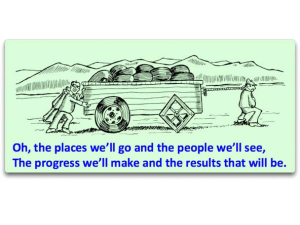 But the reality is that the manager is an unknown factor in all this in most workplaces. Surveys show that people often feel their ideas are ignored or that they are under aversive control. They will show a lot of compliance behavior, not what we want for involvement and engagement. There is often an issue of trust. And, “Trust is the residue of promises fulfilled.” (Frank Navran)
But the reality is that the manager is an unknown factor in all this in most workplaces. Surveys show that people often feel their ideas are ignored or that they are under aversive control. They will show a lot of compliance behavior, not what we want for involvement and engagement. There is often an issue of trust. And, “Trust is the residue of promises fulfilled.” (Frank Navran)
The suggestion is that managers do a better job of simply asking for ideas for improvement and productivity and that they do a better job of listening and empowering people to actually implement those ideas. What we suggest is that you take the ideas about what is not working smoothly and reframe them into possibilities that can be implemented.
If people point to something as a Square Wheel, they will naturally generate a round wheel alternative based on cognitive dissonance. The real question is, “Why bother; no one cares…”
Managers need to be identified as coaches and mentors, in addition to their other roles. They need to act as if they care about improvement and about people. Managers should be looking ahead, identifying possibilities and future outcomes, and involving and engaging their staffs for the long pull ahead.
This is part one of the thinking about people and performance. The focus is on the front end of the process of generating higher levels of involvement and doing the team building that will allow people to develop their own ideas and potential as well as improve workplace results.
If we continue to do the same thing, we can pretty much expect the same results.
Copyright 2013, 2014 Performance Management Company
 About Scott
About Scott
Dr. Scott Simmerman uses illustrations and experiential learning to stimulate and implement ideas for improvement. In this post, he will poke a bit of fun at how things really work in most organizations and share some ideas about what managers could choose to do differently to better involve and engage people in workplace performance improvement. This is intended to be some serious stuff all wrapped up in cartoons, poems and quips. Have more fun out there!
About TIGERS Success Series
TIGERS is a researched-based group development model that helps leaders build teams of employees who love coming to work on Monday morning. TIGERS is based on six principles that build high performance teams. These principles are trust, interdependence, genuineness, empathy, risk and success.
